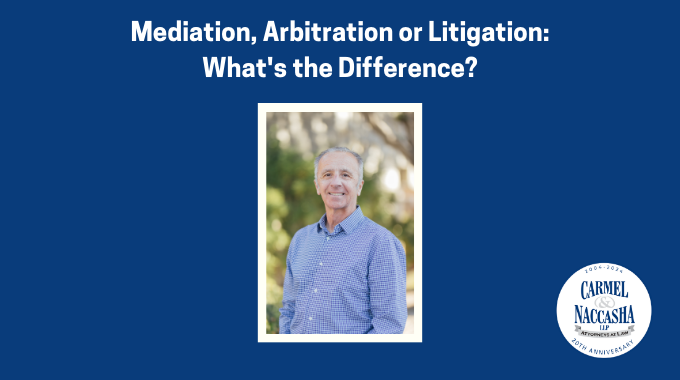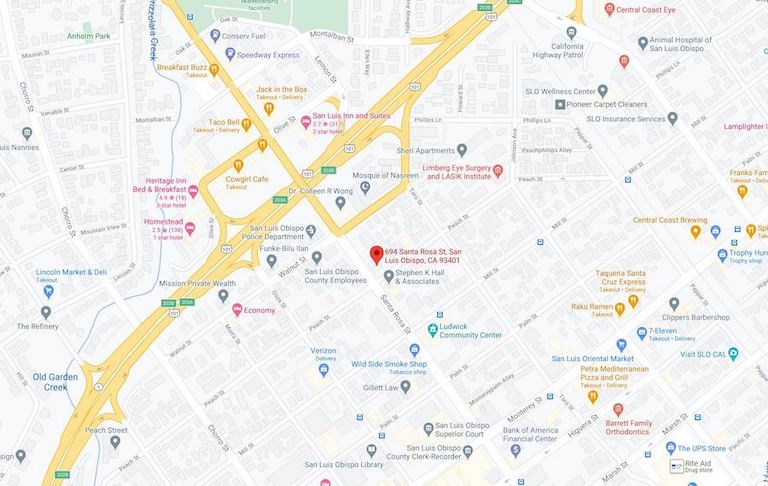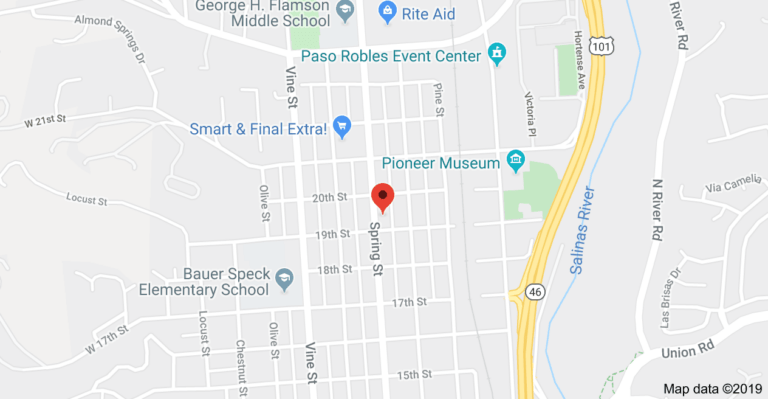By Michael M. McMahon
When disputes arise, whether in business, family matters, or other areas, understanding the various methods available to resolve a dispute is essential. Mediation, arbitration, and lawsuits are three primary avenues, each with its own advantages based on the circumstances of the case. Both in determining which method to pursue and in actually moving forwad, seeking the guidance and counsel of an experienced attorney is essential.
Mediation: A Collaborative Approach
Mediation is generally a voluntary process that uses a neutral third-party mediator to help opposing parties reach a mutually acceptable resolution of their dispute. Generally, mediators are retired judges or practicing attorneys with expertise in conflict resolution. The mediator does not produce a binding decision but rather facilitates communication, helping the parties negotiate terms and explore outcomes. Since mediation is not binding, both parties can find security in the ability to move forward to either arbitration or a lawsuit if mediation does not resolve the matter.
Mediation is voluntary: It begins when both parties agree to engage in the process. They mutually select a mediator and schedule one or more mediation sessions. During the hearing, the mediator facilitates dialogue to ensure both parties can express their views and concerns. With the help of a neutral third party, the claimants can negotiate terms, clarify issues, and pursue solutions. If the parties reach an agreement, it is documented and signed. The agreement is not legally binding, but the parties can codify it through a formal contract.
Mediation allows the involved parties to retain autonomy and control over their dispute. Since the mediator does not impose a binding decision, the parties work together to craft their own agreement. Mediation is particularly beneficial when preserving an existing relationship is important since the lowered stakes can promote cooperation. This is common in family disputes, business partnerships, or community conflicts where ongoing interactions are likely. Another benefit of mediation is that the parties have much more flexibility in resolving any issues between them, while any decision or judgment in a lawsuit is limited by the issues raised in the pleadings. At mediation, the parties can agree on almost anything, as long as it does not violate the law or public policy.
Mediation sessions are confidential, making it a preferred option for those who want to keep the details of their dispute private. Neither the mediator nor any of the parties or attorneys participating can testify as to another party’s statements or conduct at trial. Mediation is typically faster and less expensive than arbitration or litigation because it avoids the lengthy procedures and high costs associated with court trials. The informal nature of mediation grants the mediator tools that are otherwise unavailable to a judge, like the opportunity to speak without all parties present (called ex parte). The mediator’s latitude can lead to creative solutions that might not be possible in a more rigid legal framework.
Arbitration: A Binding Decision without Court
Arbitration is a more formal process than mediation. Like mediation, it relies on a neutral third-party to hear arguments. The difference is the arbitrator will issue a binding decision for the adverse parties. Often, these cases are overseen by retired judges or attorneys with expertise in a particular area of the law. Though more costly and formal than mediation, arbitration avoids many of the procedural fees and delays accompanying litigation and brings the matter to termination.
Arbitration begins with an agreement between the parties, either through a pre-existing contract that requires arbitration prior to litigation, or through an additional agreement after a dispute arises. Both parties choose the arbitrator (or arbitrators, if in a panel) or have the arbitrator selected by an arbitration organization. The parties then bring the case to a hearing, after which the arbitrator issues a binding decision to resolve the conflict, which can be enforced in court. However, binding arbitration provides no basis for appeal or otherwise challenging a decision, apart from the rare case where the non-prevailing party can establish collusion between the arbitrator and prevailing party.
In arbitration controlled by the Code of Civil Procedure, the parties may conduct discovery, though some procedures allowed as a matter of right in a lawsuit need arbitrator approval. Many instances of arbitration include a modified version of discovery, promoting the sharing of evidence and information between the conflicting parties. The arbitration process is less formal than a trial but still maintains a prescribed structure.
The arbitration option is suitable for parties needing a definitive resolution but prefer to avoid the courtroom. In complex disputes, particularly in specialized industries, parties may prefer arbitration to benefit from the expertise of an arbitrator with relevant knowledge. Like mediation, arbitration is generally confidential, making it an attractive option for those who wish to keep their dispute and its resolution private. Arbitration is also desirable compared to mediation because it provides a final resolution as there are limited grounds for appealing an arbitrator’s decision.
Litigation: The Formal Court Process
The most familiar of the three dispute resolutions, a lawsuit, is a formal legal process where a dispute is brought before a court. Through this channel, a judge (and sometimes a jury) hears evidence and arguments from the parties and makes a binding decision rooted in the law.
Litigation is appropriate for disputes involving complex legal issues that require judicial interpretation or injunctive relief. In cases where establishing a public record of the dispute and its resolution is important, litigation is the ideal course of action. In many cases, arbitrators lack authority to issue injunctions and restraining orders. Superior court judges operate under no such limitations any may, where appropriate, issue orders controlling the parties’ conduct during and after a lawsuit. Even some cases in arbitration, end up in court where a party seeks immediate injunctive relief.
Concerns regarding publicity can be relevant in matters of public interest or where precedent-setting decisions are sought. Litigation is also beneficial in disputes with a significant power imbalance between the parties, as the formal court process provides legal protections and procedures to ensure fairness. Court judgments are enforceable by law, and the court has the authority to compel parties to comply with its orders. However, unsatisfied parties may be able to appeal the decision. We also note that although courts cannot refer parties to paid mediation over their objections, most lawsuits end up being referred to mediation sooner or later.
A lawsuit begins when a person (plaintiff) brings a complaint against seeking relief another party (defendant). Once the defendant responds the case proceeds through discovery where both parties gather evidence. In many cases, proceedings also include motions challenging the sufficiency of pleadings, discovery motions, and pre-trial motions. Should the case go to trial, a judge (and possibly a jury) hears evidence and arguments and decides. The court issues a judgment, which is binding on the parties. The judgment can be appealed to a higher court in the event of a procedural error or other miscarriage of justice.
Understanding the differences between mediation, arbitration, and lawsuits is crucial in choosing the right path for resolving your dispute. Each method has its advantages and is suited to distinct types of conflicts. Mediation offers a collaborative and cost-effective solution, arbitration provides a binding decision with confidentiality, and litigation ensures a formal and enforceable resolution through the courts.
Deciding whether to pursue mediation, arbitration, or litigation depends on numerous factors, including time, resources, and the relationship between the parties. This decision should not be made without guidance and involvement from legal counsel in every step of the process.
Michael McMahon is a Partner in Carmel & Naccasha’s Litigation Practice with a focus business, real estate, employment and public agency litigation, in addition to insurance defense and corporate and business transactions. Mike can be reached at (805) 226-4148 or mmcmahon@carnaclawcom.
About Carmel & Naccasha
Founded in 2004, Carmel & Naccasha has offices in San Luis Obispo and Paso Robles. The firm’s lawyers focus their practice and provide exemplary client services in the areas of business transactions, real property, land use, commercial and employment litigation, trusts and estate planning, municipal law, and insurance coverage. For more information about Carmel & Naccasha, visit the website at www.carnaclaw.com
Contact a Legal Professional
The information provided herein does not, and is not intended to, constitute legal advice; instead, all information, content, and materials are for general informational purposes only. Neither this website nor this post are intended to create an attorney-client relationship.
If you have any questions, please contact Carmel & Naccasha, and for more details, read our full disclaimer.



